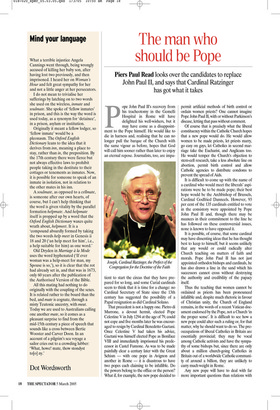Mind your language
What a terrible injustice Angela Cannings went through, being wrongly accused of killing her baby son, after having lost two previously, and then imprisoned. I heard her on Woman’s Hour and felt great sympathy for her and not a little anger at her persecutors.
I do not mean to trivialise her sufferings by latching on to two words she used on the wireless, inmate and soulmate. She spoke of ‘fellow inmates’ in prison, and this is the way the word is used today, as a synonym for ‘detainee’, in a prison, asylum or institution.
Originally it meant a fellow lodger, so ‘fellow inmate’ would be a pleonasm. The Oxford English Dictionary leans to the idea that it derives from inn, meaning a place to stay, rather than in, the preposition. By the 17th century there were fierce but not always effective laws to prohibit people taking in the destitute to their cottages or tenements as inmates. Now, it is possible for someone to speak of an inmate in isolation, not in relation to the other mates in his inn.
A soulmate, as opposed to a cellmate, is someone after our own hearts, of course, but I can’t help thinking that the word is given vitality by the parallel formation helpmate. And helpmate itself is propped up by a word that the Oxford English Dictionary waxes quite wrath about, helpmeet. It is a ‘compound absurdly formed by taking the two words help meet in Genesis ii 18 and 20 (‘an help meet for him’, i.e., a help suitable for him) as one word.’ Old Dryden in Marriage à la Mode uses the word hyphenated (‘If ever woman was a help-meet for man, my Spouse is so,’), so it is clear that the rot had already set in, and that was in 1673, only 60 years after the publication of the Authorised Version of the Bible.
All this mating had nothing to do originally with the coupling of the sexes. It is related rather to the board than the bed, and mate is cognate, through a misty Teutonic ancestry, with meat. Today we are used to Australians calling one another mate, so it comes as a pleasant surprise to find from the mid-15th century a piece of speech that sounds like a cross between Bertie Wooster and Carver Doon. In an account of a pilgrim’s sea voyage a sailor cries out to a crowding lubber: ‘What, howe! mate, thow stondyst to[o] ny.’
Dot Wordsworth


























































 Previous page
Previous page